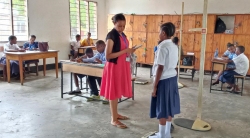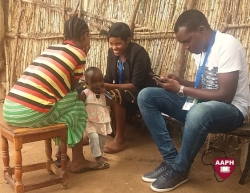In 2015, AAPH lead the implementation for the first time of the National Food Fortification Assessment Survey in Tanzania mainland and Zanzibar (FACT 2015, Survey). The Fortification Assessment Coverage Tool (FACT) is a survey instrument developed by the Global Alliance for Improved Nutrition (GAIN) for carrying out coverage assessments of large-scale food fortification programs.
Hypertensive disorders complicate 6-7% of pregnancies; they are a major cause of maternal and perinatal morbidity and mortality in low- and middle-income countries. The World Health Organization (WHO) currently recommends pregnant women living in areas with low calcium intake consume daily calcium supplementation (1500 – 2000 mg) divided into three doses and preferably taken at mealtimes, in addition to iron folic-acid once daily. An equally effective lower dose of calcium (500 mg) administered as a single dose, may help overcome these barriers and increase individual and health system adoption of this effective intervention.
Formative assessment of the school-health environment and programs in Tanzania, Ethiopia, Sudan, Burkina Faso and South Africa.
AAPH is now taking lead on the formative assessment of the school health and food environment to better understand the policy surrounding school health environments, individual and population-level risk factors, and the current state of adolescent health, as are relevant to support the design, delivery and scale-up of high impact nutrition and health interventions through schools. This study aims to assess the school health and food environment on three levels: (i) policy environment and existing interventions, (ii) the school food environment, and (iii) the state of nutrition and health for in-school adolescents ages 10-14.
Lishe Endelevu (sustainable Nutrition) is a USAID sponsored 4-year project that aims to support the government’s ambitious goal of improving nutrition outcomes for women of reproductive age, children under-five and adolescent girls. AAPH conducted the baseline survey within 4 weeks and is currently finalizing the findings’ report. For qualitative data, the analysis employed a rolling analysis approach where summary of key issues coming out of interviews were developed in special forms and used to develop themes for further analysis of the data.
Diet, Environment, and Choices of positive living (DECIDE study)
People living with HIV (PLHIV) face high food insecurity and double disease burden because food insecurity leads to lower adherence to treatment and poor health outcomes, while long-term treatment puts them at a higher risk of obesity and dyslipidemia. DECIDE has two major objectives. One being to conduct qualitative evidence synthesis on food choice among PLHIV. The other objective is to bring together three methodologies (qualitative, survey, and geo-spatial mapping) to comprehensively characterize external and personal FEs including food choice and nutrient adequacy of diets among PLHIV and their households as guided by Turner’s food environment framework and Giddens’s structuration theory.
Engaging Fathers For Effective Child Nutrition (EFFECT) and Nurturing Care (EFFECT+) in Tanzania (EFFECTS)
The overall goal of EFFECT is to reduce stunting among children under 2. In the Mara region of Tanzania, undernutrition and inadequate stimulation are significant risk factors for poor early development outcomes. Globally, 250 million children are failing to meet their developmental potential in the first five years of life with detrimental consequences to their future health, learning, behavior, and economic productivity (TDHS, 2015). EFFECT will impact families with children ages 0-18 months, the period of greatest increase in levels of chronic malnutrition and during which nutritional deficits can have long-term consequences.
ARISE is a Network for collaborative education and research activities in Africa established by Harvard T. H. Chan School of Public Health (HSPH) in partnership with Africa Academy for Public Health (AAPH) and leading institutions/organizations across the African region. In June 2014, a foundational meeting was held in Boston, MA with all partners from education and research institutions in seven African countries i.e., Botswana, Ethiopia, Ghana, Nigeria, South Africa, Tanzania and Uganda to discuss advancing coordinated and collaborative education and research activities in order to address critical gaps in population health. The meeting afforded the opportunity to establish a Network, which builds upon the numerous ongoing training and research activities among participating institutions - the Africa Research, Implementation Science and Education Network (ARISE Network).
Dodoma Demographic & Health Surveillance System: In collaboration with the University of Dodoma and the Dodoma Regional Health Management Team, AAPH has established the DHSS in Chamwino district, Dodoma. The aims of establishing this cohort study is to track health related indicators and study the impact of health interventions among residents of all ages in Dodoma region.
Dar es Salaam Urban Cohort Study was initiated in 2011 to establish and maintain a Demographic Surveillance System (DSS) that will monitor health and socio-demographic events over time in Dar es Salaam, Tanzania. The platform was developed in partnership between the Harvard T.H. Chan School of Public Health and Muhimbili University of Health and Allied Sciences. The surveillance site covers a population of approximately 100,000 residents living in close to 20,000 households in the Ukonga and Gongo la Mboto wards of Ilala district in Dar es Salaam.
Pages
- « first
- ‹ previous
- 1
- 2
- 3









